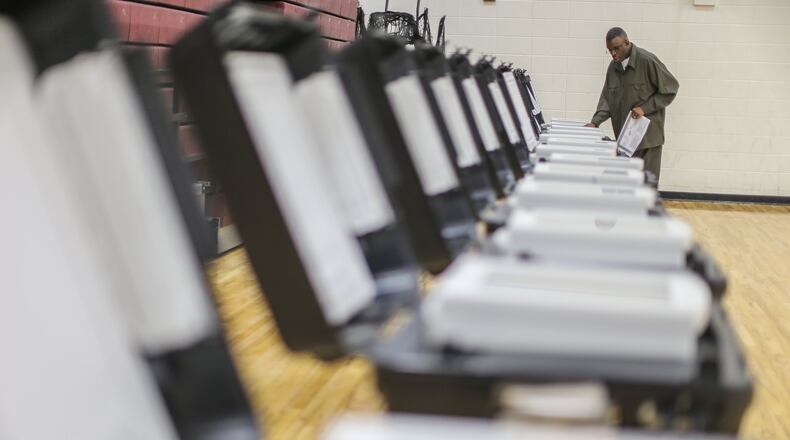A federal judge ruled Thursday that Georgia voters can cast ballots on the state’s “unsecure, unreliable and grossly outdated” electronic voting machines one last time, deciding it would be too disruptive to switch to paper ballots before this fall’s elections.
But starting with next year’s presidential primary election, paper ballots will be required, according to the ruling by U.S. District Judge Amy Totenberg. Her order barred the state from using its current electronic voting machines after this year’s elections.
Election officials are already planning to upgrade the state's voting system by buying $107 million in new equipment that will use a combination of touchscreens and printed-out paper ballots to check the accuracy of election results.
If the state's new voting system isn't completely rolled out to all 159 counties in time for the March 24 presidential primary, Totenberg ruled that voters must use paper ballots filled out by hand.
“Georgia’s current voting equipment, software, election and voter databases are antiquated, seriously flawed and vulnerable to failure, breach, contamination and attack,” Totenberg wrote.
Totenberg wrote it would be “unwise” to immediately discard the state’s 17-year-old voting machines, which lack paper ballots that could be used to check the accuracy of election results. She wrote that it could be “a recipe for disaster” to force resistant election officials to switch to hand-marked paper ballots this year while they’re also transitioning to the state’s new voting system.
Her 153-page ruling clears the way for 386 local elections to move forward as planned this fall, including votes for the Atlanta school board, the Fulton County Commission and city councils across the state.
The lawsuit by concerned voters and election integrity advocates alleged that Georgia's voting machines are vulnerable to hacking, tampering and malfunctions, undermining fundamental voting rights. Voters testified last month that those machines have flipped votes, lost ballots and posed election security risks.
"The threat of election interference has only grown since (the plaintiffs) were here before the court seeking relief one year ago in September 2018, while the state defendants have only just begun to launch necessary steps to provide a more secure election," Totenberg wrote.
Secretary of State Brad Raffensperger said Thursday that there’s no evidence that the state’s voting system has been compromised, and the transition to a new election technology by Dominion Voting Systems, announced last month, will rectify worries about election security.
“We are pleased the court endorsed the policy decisions of the state’s elected officials to move to a new paper ballot voting system in time for the 2020 elections while not disrupting 2019 elections,” Raffensperger said. “The Secretary of State’s Office is already moving full steam ahead to implement Georgia’s new paper ballot voting system in time for the March 2020 presidential preference primary.”
With the new voting system, voters will choose their candidates on touchscreens, similar to the state’s direct-recording electronic voting machines that have been in use statewide since 2002. The replacement touchscreens will be attached to printers that will create paper ballots for voters to review before inserting them into optical scanners to be counted and stored for recounts and audits.
One of the plaintiffs in the lawsuit promised to challenge Georgia’s new voting system as well, saying it will still be unsafe because computer-generated paper ballots remain untrustworthy.
“It is essential that Georgia voters’ rights to accountable elections be honored with hand-marked paper ballots, counted by optical scanners with thoroughly audited results,” said Marilyn Marks, the executive director of the Coalition for Good Governance, an organization focused on election security. “Georgia still has a long way to go to achieve this basic democratic principle.”
Though the judge rejected the plaintiffs’ demand that election officials scrap the state’s electronic voting machines for this fall’s elections, they characterized her requirement for paper ballots next year as a victory.
“This is a big win for all Georgia voters and those working across the country to secure elections and protect the right to vote,” said David Cross, an attorney for some of the plaintiffs. “The court ordered Georgia to finally take critical steps it has long refused to take to protect elections against interference and voters against disenfranchisement.”
Totenberg also ordered election officials to test using hand-marked paper ballots in at least one of this fall’s local elections, possibly in a city that already relies on paper ballots for local elections. Georgia law exempts municipal elections from the requirement for a uniform statewide voting system.
In addition, Raffensperger must address errors in voter registration databases, Totenberg ruled. Voters reported that their names went missing from registration lists, that they received the wrong ballots and that they were assigned to the wrong precincts.
Every precinct in the state must keep printouts of its registered voters, Totenberg said.
Last year, Totenberg also ruled against a quick transition to paper ballots just weeks before November’s election because she was concerned about “bureaucratic confusion and long lines.” She wrote that there was a “concrete risk” to Georgia’s electronic voting system that state leaders must address.
Since then, the General Assembly voted to buy the replacement voting system, along with making changes to improve cybersecurity practices, voter registration cancellations and absentee ballot counting.
Totenberg wrote that election officials will have to deliver on promises to improve election security, saying they’ve previously minimized threats to election integrity.
If not, fights over elections could land in court again: “It may be ‘like déjà vu all over again,’” Totenberg wrote, quoting Hall of Fame Yankees catcher Yogi Berra.
Stay on top of what's happening in Georgia government and politics at www.ajc.com/politics.
About the Author
Keep Reading
The Latest
Featured





